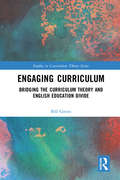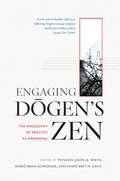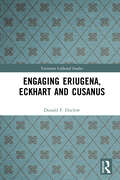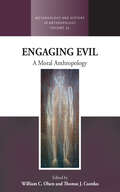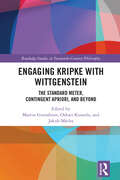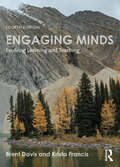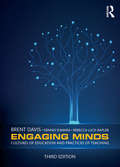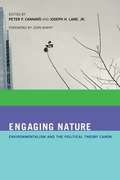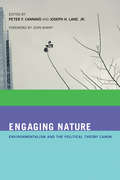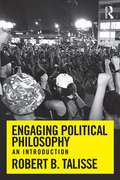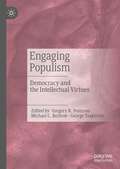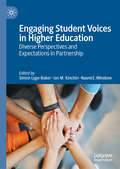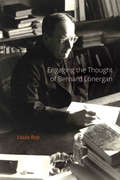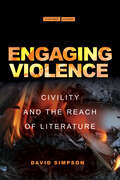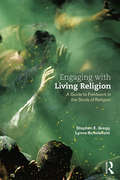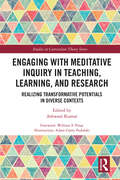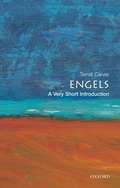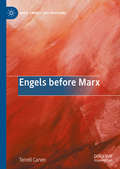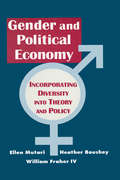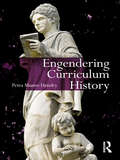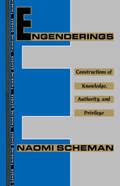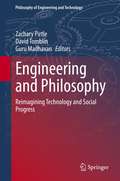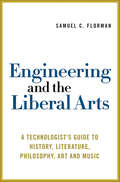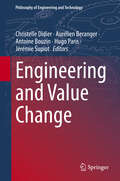- Table View
- List View
Engaging Curriculum: Bridging the Curriculum Theory and English Education Divide (Studies in Curriculum Theory Series)
by Bill GreenExplicitly linking curriculum inquiry to English education via recurring themes of representation, democracy and knowledge, this book is a call for both researchers and practitioners to engage with curriculum, explicitly and deliberatively, as both a concept and a question. The approach is broadly conceptual and constitutes an exercise in theoretical and philosophical inquiry. While deeply informed by North American debates and developments, this book offers a distinctive counterpoint and a strategically ‘ex-centric’ perspective, being equally informed by the curriculum scene in Australia, as well as the UK and elsewhere. Divided into two sections, this book first addresses matters of general curriculum inquiry, while the second turns more specifically to English teaching and to associated questions of language, literacy and literature in L1 education. Green brings the two together through a critical examination of the Australian national curriculum, especially in its implications and challenges for English teaching, and with due regard for the project of transnational curriculum inquiry.
Engaging Dogen's Zen: The Philosophy of Practice as Awakening
by Kanpu Bret Davis Shudo Brian Schroeder Tetsuzen Jason WirthHow are the teachings of a thirteenth-century master relevant today? Twenty contemporary writers unpack Dogen's words and show how we can still find meaning in his teachings. Zen Master Dogen, the thirteenth-century founder of Japanese Soto Zen Buddhism, is widely regarded as one of the world’s most remarkable spiritual thinkers. Dogen influence on both Japanese and Western Zen Buddhism cannot be overstated. His writings, emphasizing the nonduality of practice and enlightenment are vastly subtle, endlessly sophisticated—and renownedly challenging to read on one’s own. This unique collection of essays opens up for the reader new pathways for connecting to and making use of Dogen's powerful teachings. Some of Soto Zen’s leading scholars and practitioners offer a masterfully guided tour of Dogen’s writings, organized around two key texts: Shushogi, which is a classical distillation of the whole of Dogen’s teachings, and Fukanzazengi, Dogen universal instructions for Zen meditation. Along the way, the reader will gain an enriched understanding of the Zen practice and realization, of shikantaza or “just sitting,” and of the essence of Mahayana Buddhism—and a much deeper appreciation of this peerless master. Includes essays from Kosho Itagaki, Taigen Dan Leighton, Tenshin Charles Fletcher, Shudo Brian Schroeder, Glen A. Mazis, David Loy, Drew Leder, Steven DeCaroli, Steve Bein, John Maraldo, Michael Schwartz, Tetsuzen Jason M. Wirth, Leah Kalmanson, Erin Jien McCarthy, Dainen David Putney, Steven Heine, Graham Parkes, Mark Unno, Shudo Brian Schroeder, and Kanpu Bret W. Davis.
Engaging Eriugena, Eckhart and Cusanus (Variorum Collected Studies)
by Donald F. DuclowEngaging Eriugena, Eckhart and Cusanus contains two new essays and nine others published between 2005 and 2019. The essays explore Eriugena, Eckhart and Cusanus as bold thinkers deeply engaged with their times and culture. John Scottus Eriugena, Meister Eckhart and Nicholas of Cusa are key figures in the medieval Christian Neoplatonic tradition. This book focuses on their engagement with practical, experiential issues and controversies. Eriugena revises Genesis’ Adam and Eve narrative and makes sexual difference and overcoming it central to his Periphyseon. Eckhart’s Annunciation sermons urge his hearers to give birth to God’s son within their lives, and he develops a distinctive approach to pain and suffering. His radical preaching on the Eucharist and mystical union was judged heretical but was later taken up by Nicholas of Cusa. Coins and banking became key symbols in Cusanus’ exploration of humanity as created in God’s image, and he used mechanical clocks in reflecting on time and eternity. "Engagement" also describes these thinkers’ reception of their predecessors and how later readers appropriated their works. Eriugena struggled with the legacy of Augustine and the Greek Fathers. Eckhart’s theology of suffering provoked varied responses from his students Henry Suso, Johannes Tauler and the twentieth-century therapist Ursula Fleming. Cusanus provides the volume’s lynchpin as two articles analyse his reading of Eriugena and Eckhart, and a third discusses how he deftly countered Johannes Wenck’s accusations of heresy. The book will be of interest to students of Medieval Philosophy, Theology, Spirituality and their place within Cultural History.
Engaging Evil: A Moral Anthropology (Methodology & History in Anthropology #36)
by William C. Olsen Thomas J. CsordasAnthropologists have expressed wariness about the concept of evil even in discussions of morality and ethics, in part because the concept carries its own cultural baggage and theological implications in Euro-American societies. Addressing the problem of evil as a distinctly human phenomenon and a category of ethnographic analysis, this volume shows the usefulness of engaging evil as a descriptor of empirical reality where concepts such as violence, criminality, and hatred fall short of capturing the darkest side of human existence.
Engaging Heidegger
by Richard M CapobiancoOne of the most important philosophers of the twentieth century, Martin Heidegger was primarily concerned with the 'question of Being.' However, recent scholarship has tended to marginalize the importance of the name of Being in his thought. Through a focused reading of Heidegger's texts, and especially his late and often overlooked Four Seminars (1966-1973), Richard Capobianco counters this trend by redirecting attention to the centrality of the name of Being in Heidegger's lifetime of thought.Capobianco gives special attention to Heidegger's resonant terms Ereignis and Lichtung and reads them as saying and showing the very same fundamental phenomenon named 'Being itself '. Written in a clear and approachable manner, the essays in Engaging Heidegger examine Heidegger's thought in view of ancient Greek, medieval, and Eastern thinking, and they draw out the deeply humane character of his 'meditative thinking.'
Engaging Kripke with Wittgenstein: The Standard Meter, Contingent Apriori, and Beyond (Routledge Studies in Twentieth-Century Philosophy)
by Martin Gustafsson Oskari Kuusela Jakub MáchaThis volume draws connections between Wittgenstein's philosophy and the work of Saul Kripke, especially his Naming and Necessity. Saul Kripke is regarded as one of the foremost representatives of contemporary analytic philosophy. His most important contributions include the strict distinction between metaphysical and epistemological questions, the introduction of the notions of contingent a priori truth and necessary a posteriori truth, and original accounts of names, descriptions, identity, necessity, and realism. The chapters in this book elucidate the relevant connections between Kripke’s work and Wittgenstein, specifically concerning the standard meter, contingent apriori, and rule-following. The contributions shed light on how Kripke’s philosophical outlook was influenced by Wittgenstein, and how mainstream analytic philosophy and Wittgensteinian philosophy can fruitfully engage with one another. Engaging Kripke with Wittgenstein will be of interest to philosophers working on Wittgenstein, Kripke, and the history of analytic philosophy.
Engaging Minds: Evolving Learning and Teaching
by Brent Davis Krista FrancisEngaging Minds: Evolving Learning and Teaching explores the diverse beliefs and practices that define the current landscape of formal education. The revised, updated, and expanded fourth edition of this groundbreaking introduction to current interdisciplinary studies of teaching and teacher education is structured around five prominent "frames" of formal education, together offering an overview of the historical and conceptual influences on educational practice: Early Formal Education – likely emerged alongside the creation of origin myths and the invention of symbol-based writing systems, presenting needs for individuals charged with communicating, interpreting, and maintaining such knowledge; Standardized Education – began to unfold in the 1600s, when public education was invented as a response to the cultural convulsions of industrialization, urbanization, and imperialism; Authentic Education – rose to prominence over the last century as researchers began to untangle the complexity of human cognition; Democratic Citizenship Education – fuelled by civil rights movements of the 1960s, with the realization that schools often contribute to (or at least help to perpetuate) inequities and injustices; Systemic Sustainability Education – an emerging trend, as schools and other cultural institutions find themselves out of step with the transition from a mechanization-focused industrialized society to an ecologically-minded and information-based society. These frames serve as the foci of the five chapters of the book, each with three sections that deal, respectively, with history, epistemology, and pedagogy within the frame. Richly illustrated and designed, additional pedagogical features include multiple strategies to highlight and distinguish important vocabulary in the text, as well as suggestions for delving deeper into a given topic. The fourth edition is also complemented by an online resource, learningdiscourses.com, that provides analyses of more than two thousand discourses on learning in education – including summaries and critiques, along with details on their authorship, their imagery, and their associated discourses.
Engaging Minds: Cultures of Education and Practices of Teaching
by Brent Davis Dennis Sumara Rebecca Luce-KaplerEngaging Minds: Cultures of Education and Practices of Teaching explores the diverse beliefs and practices that define the current landscape of formal education. The 3rd edition of this introduction to interdisciplinary studies of teaching and learning to teach is restructured around four prominent historical moments in formal education: Standardized Education, Authentic Education, Democratic Citizenship Education, Systemic Sustainability Education. These moments serve as the foci of the four sections of the book, each with three chapters dealing respectively with history, epistemology, and pedagogy within the moment. This structure makes it possible to read the book in two ways – either "horizontally" through the four in-depth treatments of the moments or "vertically" through coherent threads of history, epistemology, and pedagogy. Pedagogical features include suggestions for delving deeper to get at subtleties that can’t be simply stated or appreciated through reading alone, several strategies to highlight and distinguish important vocabulary in the text, and more than 150 key theorists and researchers included among the search terms and in the Influences section rather than a formal reference list.
Engaging Nature
by Peter F. Cannavò John Barry Joseph H. Lane Jr.Contemporary environmental political theory considers the implications of the environmental crisis for such political concepts as rights, citizenship, justice, democracy, the state, race, class, and gender. As the field has matured, scholars have begun to explore connections between Green Theory and such canonical political thinkers as Plato, Machiavelli, Locke, and Marx. The essays in this volume put important figures from the political theory canon in dialogue with current environmental political theory. It is the first comprehensive volume to bring the insights of Green Theory to bear in reinterpreting these canonical theorists.Individual essays cover such classical figures in Western thought as Aristotle, Hume, Rousseau, Mill, and Burke, but they also depart from the traditional canon to consider Mary Wollstonecraft, W. E. B. Du Bois, Hannah Arendt, and Confucius. Engaging and accessible, the essays also offer original and innovative interpretations that often challenge standard readings of these thinkers. In examining and explicating how these great thinkers of the past viewed the natural world and our relationship with nature, the essays also illuminate our current environmental predicament.Essays onPlato Aristotle Niccolò Machiavelli Thomas Hobbes John Locke David Hume Jean-Jacques Rousseau Edmund Burke Mary Wollstonecraft John Stuart Mill Karl Marx W. E. B. Du Bois Martin Heidegger Hannah Arendt Confucius ContributorsSheryl D. Breen, W. Scott Cameron, Peter F. Cannavò, Joel Jay Kassiola, Joseph H. Lane Jr. Timothy W. Luke, John M. Meyer, Özgüç Orhan, Barbara K. Seeber, Francisco Seijo, Kimberly K. Smith, Piers H. G. Stephens, Zev Trachtenberg, Andrew Valls, Harlan Wilson
Engaging Nature: Environmentalism and the Political Theory Canon (The\mit Press Ser.)
by Jr. Lane Peter F. Cannavò John Barry Joseph H.Essays that put noted political thinkers of the past—including Plato, Machiavelli, Hobbes, Wollstonecraft, Marx, and Confucius—in dialogue with current environmental political theory.Contemporary environmental political theory considers the implications of the environmental crisis for such political concepts as rights, citizenship, justice, democracy, the state, race, class, and gender. As the field has matured, scholars have begun to explore connections between Green Theory and such canonical political thinkers as Plato, Machiavelli, Locke, and Marx. The essays in this volume put important figures from the political theory canon in dialogue with current environmental political theory. It is the first comprehensive volume to bring the insights of Green Theory to bear in reinterpreting these canonical theorists.Individual essays cover such classical figures in Western thought as Aristotle, Hume, Rousseau, Mill, and Burke, but they also depart from the traditional canon to consider Mary Wollstonecraft, W. E. B. Du Bois, Hannah Arendt, and Confucius. Engaging and accessible, the essays also offer original and innovative interpretations that often challenge standard readings of these thinkers. In examining and explicating how these great thinkers of the past viewed the natural world and our relationship with nature, the essays also illuminate our current environmental predicament.Essays onPlato • Aristotle • Niccolò Machiavelli • Thomas Hobbes • John Locke • David Hume • Jean-Jacques Rousseau • Edmund Burke • Mary Wollstonecraft • John Stuart Mill • Karl Marx • W. E. B. Du Bois • Martin Heidegger • Hannah Arendt • Confucius ContributorsSheryl D. Breen, W. Scott Cameron, Peter F. Cannavò, Joel Jay Kassiola, Joseph H. Lane Jr. Timothy W. Luke, John M. Meyer, Özgüç Orhan, Barbara K. Seeber, Francisco Seijo, Kimberly K. Smith, Piers H. G. Stephens, Zev Trachtenberg, Andrew Valls, Harlan Wilson
Engaging Political Philosophy: An Introduction
by Robert B. TalisseEngaging Political Philosophy introduces readers to the central problems of political philosophy. Presuming no prior work in the area, the book explores the fundamental philosophical questions regarding freedom, authority, justice, and democracy. More than a survey of the central figures and texts, Engaging Political Philosophy takes readers on a philosophical exploration of the core of the field, directly examining the arguments and concepts that drive the contemporary debates. Thus the fundamental issues of political philosophy are encountered first-hand, rather than through intermediary summaries of the major texts and theories. As a result, readers are introduced to political philosophy by doing philosophy. Written in a conversational style, Engaging Political Philosophy is accessible to students and general readers. Instructors can use it in the classroom as a stand-alone textbook, a complement to a standard collection of historical readings, or as a primer to be studied in preparation for contemporary readings.
Engaging Populism: Democracy and the Intellectual Virtues
by Gregory R. Peterson Michael C. Berhow George TsakiridisThe past two decades have witnessed an intensifying rise of populist movements globally, and their impact has been felt in both more and less developed countries. Engaging Populism: Democracy and the Intellectual Virtues approaches populism from the perspective of work on the intellectual virtues, including contributions from philosophy, history, religious studies, political psychology, and law. Although recent decades have seen a significant advance in philosophical reflection on intellectual virtues and vices, less effort has been made to date to apply this work to the political realm. While every political movement suffers from various biases, contemporary populism’s association with anti-science attitudes and conspiracy theories makes it a potentially rich subject of reflection concerning the role of intellectual virtues in public life. Interdisciplinary in approach, Engaging Populism will be of interest to scholars and students in philosophy, political theory, psychology, and related fields in the humanities and social sciences.
Engaging Student Voices in Higher Education: Diverse Perspectives and Expectations in Partnership
by Simon Lygo-Baker Ian M. Kinchin Naomi E. WinstoneThis book examines the importance of exploring the varied and diverse perspectives of student experiences. In both academic institutions and everyday discourse, the notion of the ‘student voice’ is an ever-present reminder of the importance placed upon the student experience in Higher Education: particularly in a context where the financial burden of undertaking a university education continues to grow. The editors and contributors explore how notions of the ‘student voice’ as a single, monolithic entity may in fact obscure divergence in the experiences of students. Placing so much emphasis on the ‘student voice’ may lead educators and policy makers to miss important messages communicated – or consciously uncommunicated – through student actions. This book also explores ways of working in partnership with students to develop their own experiences. It is sure to be of interest and value to scholars of the student experience and its inherent diversity.
Engaging the Thought of Bernard Lonergan
by Louis RoyBernard Lonergan (1904–1984) was a Canadian Jesuit philosopher, theologian, and humanist who taught in Montreal, Toronto, Rome, and Boston. His groundbreaking works Insight: A Study of Human Understanding (1957) and Method in Theology (1972) attempt to discern how knowledge is advanced in the natural sciences, the human studies, the arts, ethics, and theology. In Engaging the Thought of Bernard Lonergan, Louis Roy stresses the empirical aspect of Lonergan’s cognitional theory in relation to the role of meaning, objectivity, subjectivity, and historical consciousness. Rather than introducing every facet of his philosophy and theology, Roy delivers a balanced account of Lonergan’s achievements in fifteen discrete studies, delving into the implications of his cognitional theory for religious experience, theology, education, truth, classicism, relativism, and ethics. Discussing aspects of Lonergan’s thought that are seldom examined, these fifteen studies represent, criticize, and develop the ideas of one of the most important thinkers of the twentieth century. Demonstrating the richness of one scholar’s contributions to contemporary culture, Engaging the Thought of Bernard Lonergan presents a thoughtful analysis and a significant advance in Lonergan studies.
Engaging Violence: Civility and the Reach of Literature (Cultural Memory in the Present)
by David SimpsonRecent thinking has resuscitated civility as an important paradigm for engaging with a violence that must be deemed endemic to our lives. But, while it is widely acknowledged that civility works against violence, and that literature generates or accompanies civility and engenders tolerance, civility has also been understood as violence in disguise, and literature, which has only rarely sought to claim the power of violence, has often been accused of inciting it. This book sets out to describe the ways in which these words—violence, literature and civility—and the concepts they evoke are mutually entangled, and the uses to which these entanglements have been put. Simpson's argument follows a broadly historical trajectory through the long modern period from the Renaissance to the present, drawing on the work of historians, political scientists, literary scholars and philosophers. The result is a distinctly new argument about the complex and often mystified entanglements between literature, civility and violence in the anglophone Atlantic sphere. What now are our expectations of civility and literature, separately and together? How do these long-familiar but residually imprecise concepts stand up to the demands of the modern world? Simpson's argument is that, despite and perhaps because of their imperfect conceptualization, both persist as important protocols for the critique of violence.
Engaging with Living Religion: A Guide to Fieldwork in the Study of Religion
by Stephen E. Gregg Lynne ScholefieldUnderstanding living religion requires students to experience everyday religious practice in diverse environments and communities. This guide provides the ideal introduction to fieldwork and the study of religion outside the lecture theatre. Covering theoretical and practical dimensions of research, the book helps students learn to ‘read’ religious sites and communities, and to develop their understanding of planning, interaction, observation, participation and interviews. Students are encouraged to explore their own expectations and sensitivities, and to develop a good understanding of ethical issues, group-learning and individual research. The chapters contain student testimonies, examples of student work and student-led questions.
Engaging with Meditative Inquiry in Teaching, Learning, and Research: Realizing Transformative Potentials in Diverse Contexts (Studies in Curriculum Theory Series)
by Ashwani Kumar Adam Garry PodolskiThis collection of multi/inter-disciplinary essays explores the transformative potential of Ashwani Kumar’s work on meditative inquiry – a holistic approach to teaching, learning, researching, creating, and living – in diverse educational contexts. Aspiring to awaken awareness, intelligence, compassion, collaboration, and aesthetic sensibility among students and their teachers through self-reflection, critique, dialogue, and creative exploration, this volume: Showcases unique ways in which scholars from diverse disciplinary, cultural, and geographic contexts have engaged with meditative inquiry in their own fields. Provides a space where African, Asian, Buddhist, Indigenous, and Western scholars engage with the idea of meditative inquiry from their own cultural, philosophical, and spiritual traditions, perspectives, and practices. Explores a variety of themes in relation to meditative inquiry including arts-based research, poetic inquiry, Africentricity, Indigenous thinking, martial arts, positive psychology, trauma, dispute resolution, and critical discourse analysis. Offers insights into how the principles of meditative inquiry can be incorporated in classrooms and, thereby, contributes to the growing interest in mindfulness, meditation, and other holistic approaches in schools and academia. The diverse and rich contributions contained in this volume offer valuable perspectives and practices for scholars, students, and educators interested in exploring and adopting the principles of meditative inquiry in their specific fields and contexts.
Engels: A Very Short Introduction
by Terrell CarverEngels was the father of dialectical and historical materialism, and was the first Marxist historian, anthropologist, philosopher, and commentator on early Marx. In later years he developed a materialist interpretation of history, which had revolutionary effects on the arts and social sciences. Carver traces its source and its effect on the development of Marxist theory and practice, assesses its utility, and discusses the difficulties that Marxists have encountered in defending it.
Engels before Marx (Marx, Engels, and Marxisms)
by Terrell CarverThis book examines the life and works of Friedrich Engels during the decade before he entered a political partnership with Karl Marx. It takes a thematic approach in three substantial chapters: Imagination, Observation, and Vocation. Throughout, the reader sees the world from Engels’s perspective, not knowing how his story will turn out. This approach reveals the multifaceted and ambitious character of young Friedrich’s achievements from age sixteen till just turning twenty-five. At the time that he accepted Marx’s invitation to co-author a short political satire, Engels was far better known and much more accomplished. He had published many more articles on far more subjects, in both German and English, than Marx had managed. Moreover, he had written a critique of political economy from a perspective unique in the German context, and published his own pioneering and substantial study of working class conditions in an industrializing economy. Offering an innovative approach to a largely neglected period of Engels’s life before meeting Marx, Carver upends standard narratives in existing biographical studies of Engels to reveal him as an important figure not just in relation to his more famous collaborator, but a key voice in the liberal-democratic, constitutional and nation-building revolutionism of the 1830s and 1840s.
Engendered Economics: Incorporating Diversity into Political Economy
by Heather Boushey Ellen Mutari William FraherThis book provides an overview of current developments within feminist political economy, including reformulations of economic theory, historical and empirical research on the economic roles and status of women and people of color, as well as proposals for broadening the public policy agenda. Rather than offering a feminist critique of neoclassical economics, this volume presents feminist economics in dialogue with progressive economic theory and public policy. It differentiates itself further by addressing issues of class, race and sexuality in interaction with gender.
Engendering Curriculum History (Studies in Curriculum Theory Series)
by Petra HendryHow can curriculum history be re-envisioned from a feminist, poststructuralist perspective? Engendering Curriculum History disrupts dominant notions of history as linear, as inevitable progress, and as embedded in the individual. This conversation requires a history that seeks re-memberance not representation, reflexivity not linearity, and responsibility not truth. Rejecting a compensatory approach to rewriting history, which leaves dominant historical categories and periodization intact, Hendry examines how the narrative structures of curriculum histories are implicated in the construction of gendered subjects. Five central chapters take up a particular discourse (wisdom, the body, colonization, progressivism and pragmatism) to excavate the subject identities made possible across time and space. Curriculum history is understood as an emergent, not a finished, process – as an unending dialogue that creates spaces for conversation in which multiple, conflicting, paradoxical and contradictory interpretations can be generated as a means to stimulate more questions, not grand narratives.
Engenderings: Constructions of Knowledge, Authority, and Privilege (Thinking Gender)
by Naomi SchemanFirst published in 1993. Routledge is an imprint of Taylor & Francis, an informa company.
Engineering and Philosophy: Reimagining Technology and Social Progress (Philosophy of Engineering and Technology #37)
by Guru Madhavan Zachary Pirtle David TomblinEngineers love to build “things” and have an innate sense of wanting to help society. However, these desires are often not connected or developed through reflections on the complexities of philosophy, biology, economics, politics, environment, and culture. To guide future efforts and to best bring about human flourishment and a just world, Engineering and Philosophy: Reimagining Technology and Progress brings together practitioners and scholars to inspire deeper conversations on the nature and varieties of engineering. The perspectives in this book are an act of reimagination: how does engineering serve society, and in a vital sense, how should it.
Engineering and the Liberal Arts: A Technologist's Guide to History, Literature, Philosophy, Art and Music
by Samuel C. FlormanFrom the author who inspired inaugural poet Richard Blanco! Engineering and the Liberal Arts remains a fresh and provocative book, using the familiar world of technology to guide a new generation of engineers through the stimulating world of the liberal arts. Beginning with a penetrating and enlightening discussion of how exposure to the arts can enrich and reward nearly every aspect of an engineer's life, Samuel Florman—himself a decorated engineer with over fifty years' experience in the field—boldly explores the natural relationship between liberal arts and technology. Sweeping away traditional barriers separating the two fields, Florman establishes a rich and vital communication of ideas between scientist and artist.By linking the history of technology to world history, the truth of science to philosophy, utility of form to painting and sculpture, and the world of view of the engineer to literature, Florman builds a series of bridges connecting science to art. A complete survey of the arts in and of itself, this impressive volume constitutes an introduction to the infinite variety of pleasures afforded through study of the liberal arts, paving the way to a richer, fuller life for the engineer.
Engineering and Value Change (Philosophy of Engineering and Technology #48)
by Christelle Didier Aurélien Béranger Antoine Bouzin Hugo Paris Jérémie SupiotThis volume consists of chapters derived from the best papers submitted to the 2023 Forum on Philosophy, Engineering, and Technology (fPET) meeting that took place in April 2023 at Delft University of Technology. Topics and fields covered within the volume include applied ethics, meta-ethics, value theory, education, responsible innovation, political philosophy and value-sensitive design. The contributors present research that addresses the challenges of engineering in a changing world. This text is of interest to students and researchers working in the fields of engineering and philosophy.
